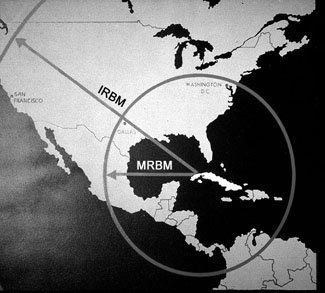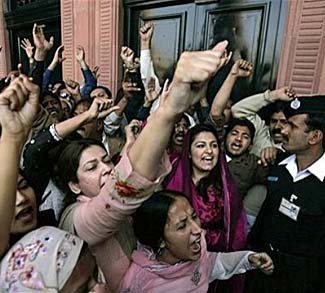FORECAST
Conceding to the growing political power of the people, Pakistan’s government reinstated a deposed Chief Justice in order to stem a political crisis, however the weakening of the government’s authority threatens to leave a power vacuum that may be filled by armed militant groups such as the Taliban.
On Monday, Prime Minister Yousuf Raza Gilani announced the reinstatement of the Chief Justice of the Supreme Court, Iftikhar Mohammad Chaudhry, effective as of March 21, 2009. The sudden reversal of the government’s position results from a week of political chaos during which the country had essentially degenerated into martial law after the police, army, and paramilitary forces were deployed to prevent throngs of protestors, led by lawyers and opposition activists committed to the restoration of an independent judiciary, from partaking in a ‘Long March’ to the capital, Islamabad.
The protestors demonstrated on behalf of the deposed Chief Justice after President Asif Ali Zardari reneged on his promise to reinstall all justices unseated by the former dictator, General Pervez Musharraf. Musharraf, an American ally in the “war on terror”, removed Chaudhry from his judicial position in 2007 on the eve of Chaudhry’s decision on the constitutionality of Musharraf’s military dictatorship.
It appears then that Zardari, fearful of such an independent-minded Chief Justice, reneged on his campaign promise of reinstalling the popular judicial figure lest Chaudhry nullifies an amnesty against graft charges that the unconstitutionally elected Musharraf gave the then-fugitive Zardari and his late wife, former Prime Minister Benazir Bhutto, which enabled their return in 2007.
However, Zardari’s hand was forced after opposition party leader, former Prime Minister Nawaz Sharif, broke his house arrest to join the protestors march on Islamabad, ensuring his popularity amongst a citizenry increasingly skeptical of Zardari’s growing anti-democratic dictatorship-in-waiting [see http://www.geopoliticalmonitor.com/content/weekly_forecasts/2009-03-02/political-turmoil-in-pakistan-march-2-2009 for a report on Nawaz Sharif’s recent judicial ban from political office].
Zardari’s hand may have also been forced by outside pressure from the U.S. and Britain, as evidenced by the flurry of political and diplomatic activity aimed at stemming widespread civil unrest that could have implications on regional security in relation to the war in Afghanistan, as well as reports of an alleged 24-hour ultimatum by Washington.
The compelled reinstallation of Chief Justice Chaudhry not only severely weakens President Zardari’s leadership, but further empowers a citizenry tentatively discovering its own power vis-à-vis the political and military establishment that has too long dominated the country, a growing power that felled Musharraf’s dictatorship following mass demonstrations similar to those held this week against Zardari.
The weakening of the central government’s authority, however, threatens to leave a power vacuum that may be filled by groups operating outside of the establishment hierarchy, particularly armed militant groups such as the Taliban.
Nonetheless, even though the current crisis threatens Pakistan’s political stability, and even if the Supreme Court does void the political compromise that allowed Zardari to return to political office (which would effectively judicially bar the two most powerful political party leaders from elected office), the emerging sense of political power amongst the Pakistani people ought to allow them to escape the vice of the most retarding forces in Pakistan’s democratic growth: the Bhutto and Sharif clans.
SUMMARY OF EVENTS: March 9 – 16, 2009
WORLD
As the growing world-wide economic crisis deepens, military forces from Canada, the United States, and the United Kingdom are preparing to meet angry citizens on the street.
Two United Nations special rapporteurs said Tuesday they would investigate secret detention centres used by the CIA in counter-terrorism efforts.
Surfers on the Internet are at increasing risk from governments and corporations tracking the sites they visit to build up a picture of their activities, the founder of the World Wide Web said on Friday.
NORTH AMERICA
United States
A newly leaked military document appears to show the Pentagon knowingly exposed U.S. troops to toxic chemicals that cause cancer, while publicly downplaying the risks exposure might cause.
The U.S. Navy ship that got into a scrape with five Chinese vessels last weekend in the South China Sea was looking for threats such as submarines—presumably Chinese—in waters that China claims as its own, defense officials acknowledged Tuesday.
Investigative reporter Seymour Hersh dropped a bombshell on Tuesday when he told an audience at the University of Minnesota that the military was running an “executive assassination ring” throughout the Bush years which reported directly to former Vice President Dick Cheney.
President Obama weighed in Wednesday on the escalating drug war on the U.S.-Mexico border, saying that he was looking at possibly deploying National Guard troops to contain the violence but ruled out any immediate military move.
Taxpayers lack an accurate picture of how companies receiving billions of dollars in federal funds through the Troubled Assets Relief Program are spending their money, members of a House panel said on Wednesday.
Tighter gun control and stronger law enforcement in Southwestern states were recommended Thursday by lawmakers concerned about drug violence in Mexico possibly spilling across the border.
SOUTH AMERICA
Bolivia
Bolivian President Evo Morales on Monday ordered the expulsion of a senior U.S. diplomat in the country, accusing him of participating in a “conspiracy” against Bolivia’s far-left government.
Venezuela
Venezuelan President Hugo Chavez has said the armed forces are ready for a war with Colombia should the country provoke it.
WESTERN EUROPE
Switzerland, Luxembourg and Austria said they will soften rules on banking secrecy, responding to growing international pressure to root out tax dodgers.
Britain
A policeman was shot dead in Northern Ireland Monday, two days after the killing of two British soldiers in an apparent escalation of violence designed to derail the peace process.
Greece
A Greek militant group threatened in a statement published Thursday to continue its bombing campaign, saying recent attacks against Citibank were in response to the international financial crisis.
MIDDLE EAST
Iraq
At least 33 Iraqis were killed in a suicide attack in the west of Baghdad on Tuesday, raising concerns of the resurgence of violence in the war-torn country.
EAST ASIA
Japan
Japan said on Friday it could shoot down any threatening object falling toward its territory, after North Korea said a planned rocket launch would send it across Japanese territory.
North Korea
North Korea put its military on combat alert Monday as U.S. and South Korean troops began a major joint exercise, and warned that any attempt to block its upcoming satellite launch would spark a war.
North Korea’s Foreign Ministry on Wednesday accused the United States of preparing for a war against the communist state in Pyongyang’s first verbal criticism of the Obama Administration.
North Korea has announced it will launch a satellite early next month, the International Maritime Organisation said Thursday, as Washington and Seoul told Pyongyang to scrap what they see as a disguised missile test.
SOUTH ASIA
Bangladesh
Investigators in Bangladesh have found evidence suggesting Islamic militants helped plot a mutiny in the capital in which more than 70 people were killed, a minister said on Thursday.
Pakistan
Pakistani authorities banned protests and rounded up hundreds of activists on Wednesday, officials said, a day before a rally by lawyers and opposition parties that could destabilize a fragile, year-old government.
Pakistani police clashed on Thursday with black-suited lawyers and opposition activists after the launch of a cross-country protest rally in defiance of government attempts to stop it.
Pakistan leaders scrambled Friday to find a compromise deal to head off a political crisis as police extended a crackdown trying to foil a mass anti-government protest that has raised fears of unrest.
AFRICA
Madagascar
Madagascar’s government has said it will take action against soldiers who rebelled at a key army base amid a deepening political crisis in the country.
Madagascar’s opposition said Friday it was close to toppling a government which in turn called on its poverty-stricken population to protect the presidential palace.
Manjit Singh is a contributor to Geopoliticalmonitor.com



